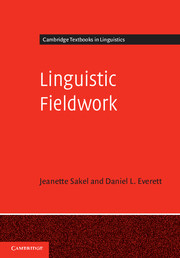3 - The languages
Published online by Cambridge University Press: 05 December 2012
Summary
This chapter is about the languages studied, as well as the other languages used during fieldwork. Apart from the target language, which is the term we will be using for the language or languages under scrutiny, the other languages may include a lingua franca you and the speakers have in common. Of course, you may not need a lingua franca if you are conducting fieldwork in or on your native tongue, or you may choose to do monolingual fieldwork, in which case only the target language will be spoken in the fieldwork setting.
In the second part of the chapter we will discuss the advantages of learning the target language. Whether you analyse an aspect of a language, write a grammar or investigate a multilingual situation, some knowledge about the target language is very helpful prior to embarking on your study. That does not, by any means, imply that you have to be a native-like speaker of the language or languages in your study! In some cases, having access to grammars or other materials may suffice; in others you may learn the languages at the same time as carrying out your fieldwork. In the following sections we will explore differences in spoken and written data. Then we proceed to the challenges involved in working with small and large language groups, endangered languages versus viable languages and purely oral languages versus those with a rich literary tradition. The final part of this chapter deals with ways in which you can find a language or languages to work on.
- Type
- Chapter
- Information
- Linguistic FieldworkA Student Guide, pp. 26 - 43Publisher: Cambridge University PressPrint publication year: 2012



